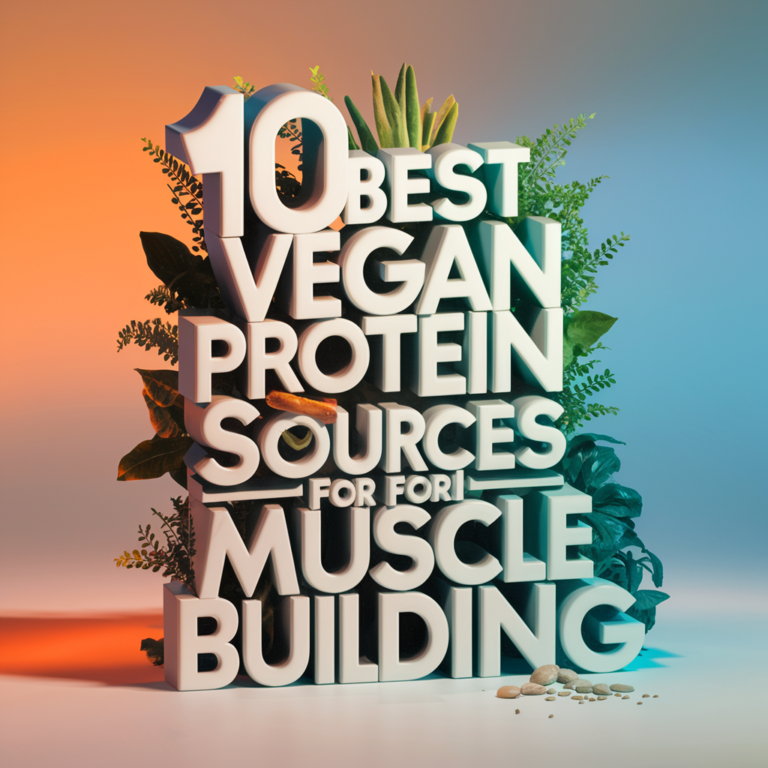Table of Contents
Vegan Protein Sources for Muscle Building
Building muscle on a vegan diet is not only possible but can be highly effective when you choose the right protein sources. This comprehensive guide will walk you through the top 10 vegan protein options that can help you achieve your muscle-building goals while adhering to a plant-based lifestyle. We’ll also cover essential tips, nutritional information, and address common questions to ensure you have all the tools needed for success.
Why Protein Matters for Muscle Building
Before diving into our list of top vegan protein sources, it’s crucial to understand why protein is so important for muscle building:
- Muscle Repair and Growth: Protein provides the essential amino acids needed to repair and build new muscle tissue after exercise.
- Hormone Production: Adequate protein intake supports the production of hormones that promote muscle growth, such as testosterone and insulin-like growth factor (IGF-1).
- Recovery: Protein helps reduce muscle soreness and speeds up recovery between workouts.
- Metabolic Boost: A high-protein diet can increase your metabolic rate, helping you maintain a lean physique.
Top 10 Vegan Protein Sources for Muscle Building
1. Seitan
Often called “wheat meat,” seitan is made from vital wheat gluten and is incredibly high in protein.
- Protein content: About 25g per 100g
- Complete protein: No (low in lysine)
- Best uses: Stir-fries, sandwiches, and as a meat substitute in various recipes
Pro tip: Combine seitan with legumes to create a complete protein profile. Try a seitan and chickpea curry for a protein-packed meal.
2. Tofu
A versatile soy-based protein that’s been a staple in Asian cuisines for centuries.
- Protein content: About 8g per 100g
- Complete protein: Yes
- Best uses: Scrambles, stir-fries, grilled, or in smoothies
Pro tip: Press tofu to remove excess water for a firmer texture, perfect for grilling or baking. Marinate tofu in your favorite flavors for at least 30 minutes before cooking to enhance taste.
3. Tempeh
Made from fermented soybeans, tempeh offers a nutty flavor and firm texture.
- Protein content: About 19g per 100g
- Complete protein: Yes
- Best uses: Marinated and grilled, crumbled in stir-fries, or as a bacon substitute
Pro tip: Steam tempeh before marinating to help it absorb more flavor. Try crumbling tempeh into a vegan chili for a protein-rich, hearty meal.
4. Lentils
These versatile legumes are packed with protein and fiber.
- Protein content: About 9g per 100g (cooked)
- Complete protein: No (low in methionine)
- Best uses: Soups, curries, salads, or as a base for veggie burgers
Pro tip: Pair lentils with whole grains like brown rice or quinoa for a complete protein meal. Sprouted lentils can increase nutrient absorption and reduce cooking time.
5. Chickpeas
Also known as garbanzo beans, chickpeas are nutrient-dense and protein-rich.
- Protein content: About 9g per 100g (cooked)
- Complete protein: No (low in methionine)
- Best uses: Hummus, falafel, roasted as a snack, or added to salads
Pro tip: Save the aquafaba (chickpea water) for use as an egg white substitute in baking. Try making chickpea flour pancakes for a high-protein breakfast option.
6. Quinoa
A protein-rich pseudo-grain that’s also a complete protein.
- Protein content: About 4.4g per 100g (cooked)
- Complete protein: Yes
- Best uses: As a base for Buddha bowls, in salads, or as a side dish
Pro tip: Rinse quinoa before cooking to remove its natural bitter coating. Try a quinoa and black bean salad for a protein-packed lunch option.
7. Pea Protein
A popular protein powder derived from yellow peas.
- Protein content: About 80g per 100g (powder)
- Complete protein: Yes
- Best uses: In smoothies, protein shakes, or baked goods
Pro tip: Mix pea protein with other plant-based proteins for a more balanced amino acid profile. Add pea protein to your post-workout smoothie for quick muscle recovery.
8. Nutritional Yeast
A deactivated yeast with a cheesy flavor, rich in protein and B-vitamins.
- Protein content: About 50g per 100g
- Complete protein: Yes
- Best uses: As a cheese substitute, sprinkled on popcorn, or in sauces
Pro tip: Look for fortified nutritional yeast to ensure you’re getting B12. Use nutritional yeast to create a vegan “cheese” sauce for pasta or vegetables.
9. Hemp Seeds
Small but mighty seeds packed with protein and omega-3 fatty acids.
- Protein content: About 32g per 100g
- Complete protein: Yes
- Best uses: Sprinkled on salads, added to smoothies, or used in baking
Pro tip: Store hemp seeds in the refrigerator to preserve their delicate oils. Try making a hemp seed pesto for a protein-rich sauce.
10. Edamame
Young soybeans that are both delicious and nutritious.
- Protein content: About 11g per 100g
- Complete protein: Yes
- Best uses: As a snack, in stir-fries, or added to salads
Pro tip: Buy frozen edamame for a convenient protein boost anytime. Try making an edamame hummus for a twist on the classic recipe.
Nutrition Comparison Table
| Protein Source | Protein (g per 100g) | Complete Protein | Other Notable Nutrients |
|---|---|---|---|
| Seitan | 25 | No | Iron, Calcium |
| Tofu | 8 | Yes | Calcium, Iron, Manganese |
| Tempeh | 19 | Yes | Fiber, Probiotics, Magnesium |
| Lentils | 9 | No | Fiber, Iron, Folate |
| Chickpeas | 9 | No | Fiber, Iron, Phosphorus |
| Quinoa | 4.4 | Yes | Fiber, Iron, Magnesium |
| Pea Protein (powder) | 80 | Yes | Iron, BCAAs |
| Nutritional Yeast | 50 | Yes | B-vitamins, Zinc |
| Hemp Seeds | 32 | Yes | Omega-3 fatty acids, Magnesium |
| Edamame | 11 | Yes | Fiber, Vitamin K, Folate |
Tips for Maximizing Protein Intake on a Vegan Diet
- Diversify your protein sources: Eating a variety of plant-based proteins ensures you’re getting all essential amino acids.
- Increase protein absorption: Pair iron-rich plant proteins with vitamin C sources to enhance absorption.
- Plan your meals: Aim to include a protein source in every meal and snack.
- Consider protein powders: For athletes or those with higher protein needs, vegan protein powders can be a convenient supplement.
- Don’t forget about leafy greens: While not as protein-dense, they contribute to overall protein intake and provide vital nutrients.
- Optimize protein timing: Consume protein within 30 minutes after your workout to support muscle recovery and growth.
- Stay hydrated: Proper hydration is crucial for protein synthesis and overall muscle function.
- Incorporate protein-rich snacks: Keep high-protein vegan snacks like roasted chickpeas or homemade protein bars on hand.
Conclusion
Building muscle on a vegan diet is entirely achievable with the right protein sources and a well-planned diet. By incorporating these 10 vegan protein powerhouses into your meals, you can ensure you’re getting enough high-quality protein to support muscle growth and recovery. Remember, consistency in both your diet and training regimen is key to seeing results.
Experiment with different combinations and recipes to keep your meals exciting and nutritious. Don’t be afraid to get creative in the kitchen and try new plant-based protein sources. With dedication and the right nutrition strategy, you can achieve your muscle-building goals while maintaining a vegan lifestyle.
Always consult with a registered dietitian or nutritionist to create a personalized meal plan that meets your specific needs and goals. Happy muscle building!
Frequently Asked Questions (FAQs)
1Q: Can I really build muscle on a vegan diet?
1A: Absolutely! With proper planning and attention to protein intake, vegan athletes can successfully build muscle. The key is to consume a variety of plant-based proteins to ensure you’re getting all essential amino acids, and to eat enough calories to support muscle growth.
2Q: How much protein do I need to build muscle on a vegan diet?
2A: The general recommendation for athletes looking to build muscle is 1.6 to 2.2 grams of protein per kilogram of body weight per day. For a 70kg (154 lb) person, this would be about 112-154 grams of protein daily. However, individual needs may vary based on factors such as activity level, age, and overall health.
3Q: Are plant-based proteins as effective as animal proteins for muscle building?
3A: While animal proteins are often considered “complete” proteins, many plant-based proteins can be just as effective for muscle building when consumed in the right combinations and quantities. Studies have shown that vegan athletes can achieve similar strength and muscle gains as their omnivorous counterparts when protein intake is adequate.
4Q: How can I ensure I’m getting all essential amino acids on a vegan diet?
4A: To ensure you’re getting all essential amino acids, focus on eating a variety of plant-based proteins throughout the day. Combine foods like legumes with grains, or include complete plant proteins like quinoa and soy products in your diet. It’s not necessary to combine these foods at every meal, as long as you’re getting a variety over the course of the day.
5Q: Are there any potential nutrient deficiencies I should be aware of as a vegan athlete?
5A: While a well-planned vegan diet can meet all your nutritional needs, some nutrients to pay special attention to include vitamin B12, iron, zinc, calcium, and omega-3 fatty acids. Consider having your nutrient levels checked regularly and discuss supplementation with a healthcare provider if needed.

